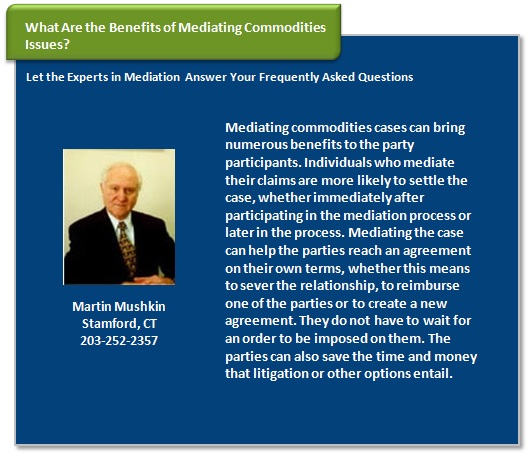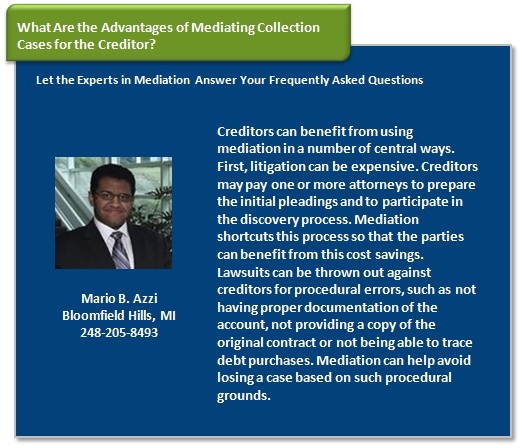
What to Expect from Commodities Mediation
 Although mediation has been around for several decades, it continues to expand into new and exciting areas. Commodities matters may involve issues related to futures such as making investments based on ideas related to the future market prices of the investments. Mediation may be used to resolve issues related to future investments, claims against introducing brokers, merchant commission, allegations regarding misrepresentations or omissions of material facts, providing unsuitable investment advice, conflicts of interest and other matters involved with commodities.
Although mediation has been around for several decades, it continues to expand into new and exciting areas. Commodities matters may involve issues related to futures such as making investments based on ideas related to the future market prices of the investments. Mediation may be used to resolve issues related to future investments, claims against introducing brokers, merchant commission, allegations regarding misrepresentations or omissions of material facts, providing unsuitable investment advice, conflicts of interest and other matters involved with commodities.
In mediation, the parties agree to meet with the help of an unbiased mediator who may have special training in the topics. In addition to this special knowledge, the mediator also has a special background in conflict resolution and communication training. He or she can often communicate in a way that the parties have not encountered so that he or she can understand the source of the conflict, realize what the parties are after and assess what possible solutions the parties may agree to.
The parties benefit from the mediation process because they get to see their case from a neutral perspective and can realize the possible alternatives if they do not reach a settlement on their own terms through mediation. They also have access to the other party and the ability to negotiate a settlement directly rather than waiting for a remedy furnished by a judge or jury who are not familiar with the parties.
Because many people working in commodities rely on ongoing relationships, mediation can help the parties approach the problem in a more cordial manner that is more likely to preserve relationships. While parties involved in litigation or arbitration will likely terminate their relationship, those involved in mediation may be more likely to maintain this relationship and maybe even strengthen it so that it can lead to new business dealings in the future.
Mario B. Azzi

Utilizing the Mediation Process in Collection Cases
 Mediation can be used in a number of cases as an effective and affordable way to resolve conflict. This method can be used in collection cases as a way to help debtors and creditors find middle ground and come up with a solution that benefits both of them. At the end of successful mediation, the parties can have a new agreement in place that is enforceable as a separate contract.
Mediation can be used in a number of cases as an effective and affordable way to resolve conflict. This method can be used in collection cases as a way to help debtors and creditors find middle ground and come up with a solution that benefits both of them. At the end of successful mediation, the parties can have a new agreement in place that is enforceable as a separate contract.
Litigation is expensive and time-consuming. Both parties often hire attorneys and must then pay the legal expenses associated with prosecuting or defending claims. Litigation is also public, often leading to embarrassment to one or both parties. Even if one of the parties wins at court, it must then pursue separate enforcement action in order to secure funds to pay off the debt. Debtors may be entitled to certain exemptions that represents property that creditors cannot attach to a judgment.
Mediation is a way to resolve issues outside of court. The parties work together instead of as adversaries, attempting to reach a mutually-satisfactory solution. The parties may communicate directly or with a mediator going back and forth to take different ideas and possible settlement solutions to the parties.
Mediation allows the parties to exercise more creativity as the parties are generally free to reach any legal resolution to their claim. The mediator may encourage the parties to brainstorm possible ideas. The parties may come up with a number of different solutions, such as paying off a fraction of the total debt, allowing a forbearance on debt payments until a certain amount of time passes or making smaller payments for an extended period of time. Mediation helps the parties save time and avoid the expenses related to litigation.
July 17, 2017
Americans in this field have the highest rate of divorce by age 30 – Workers in certain fields are seeing higher divorce rates by age 30, a new analysis of U.S. Census Data from career website Zippia found. The highest divorce rate was for first-line enlisted military supervisors, its analysis of Census Bureau’s Public Use Microdata Sample, or PUMS, data found. They had a divorce rate of 30%. The occupation involves leading operations and coordinating the activities of enlisted military personnel.
Your credit score soon will get a buffer from medical-debt wrecks – For many consumers, an unexpected healthcare calamity can quickly burgeon into a financial calamity. Just over half of all the debt that appears on credit reports is related to medical expenses, and consumers may find that their credit score gets as banged up as their body.
Teachers With Student Debt: The Struggle, The Causes And What Comes Next – Teachers are paid significantly less than many other highly educated professionals. We decided to take a look at student debt among teachers specifically, because we see it as a crossroads of several big trends: chronic concerns over teacher pay amid calls to improve teacher quality; the rising cost of higher ed; the increasing reliance on loans to pay for it; and changing policies from the Trump administration.
ADR of Cannabis Issues
 With more states legalizing cannabis for medicinal or recreational purposes, there are more cannabis legal issues that are arising. In the marijuana industry, there are a number of new business relationships that have developed in a short period of time, including distribution deals, partnerships and licensing relationships. Like in all other types of business dealings, the potential for disputes to arise between partners, competitors or parties working together is present. Conflict can arise in this context as well as in others, such as issues involving legal cannabis use and employment and housing matters.
With more states legalizing cannabis for medicinal or recreational purposes, there are more cannabis legal issues that are arising. In the marijuana industry, there are a number of new business relationships that have developed in a short period of time, including distribution deals, partnerships and licensing relationships. Like in all other types of business dealings, the potential for disputes to arise between partners, competitors or parties working together is present. Conflict can arise in this context as well as in others, such as issues involving legal cannabis use and employment and housing matters.
Due to the new nature of this industry, many individuals and businesses are choosing to use ADR instead of litigating when troubles arise. Courts are often slow to change and may support traditional commercial businesses rather than individuals or businesses that they perceive as being invested in the “pot” frenzy. Another reason why individuals may steer clear of the court for resolution is because judges and juries might punish both parties when they do not like them. To avoid these negative possibilities, parties are increasingly adding mediation and arbitration clauses in their contracts.
Mediation involves the parties meeting with a third party neutral who hears both sides of the dispute and tries to help the parties reach a resolution. The mediator does not impose any type of decision on the parties. Instead, he or she helps the parties negotiate between themselves so that they can avoid court.
Arbitration puts the decision-making authority in the hands of a decision maker that the parties have selected. This helps them select someone who is not prejudiced against cannabis. The arbitrator may have additional subject matter expertise based on a history of creating licensing deals or litigating contract issues.





